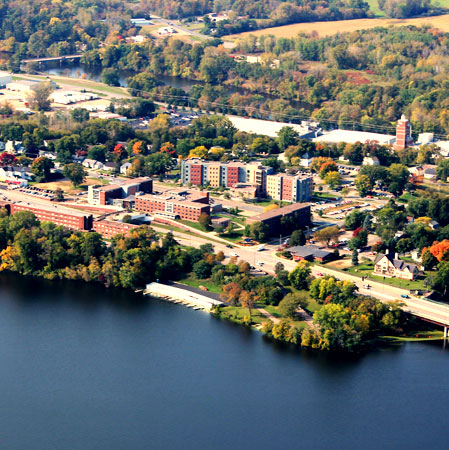New agreement will protect local watershed
6 May 2015
Natural Resourses
By Barbara Lyon for the Dunn County News
A new farmland lease agreement has the potential to reduce run-off from a local watershed into Lake Menomin — and provide students with valuable learning experience.
This spring, students from Chippewa Valley Technical College’s agri-science tehnician and farm business production managements programs will be working with the Dunn County Conservation and UW-Extension departments to get real-life experience in the best practices of soil and water management.
The initiative came into being thanks to a unique collaboration among CVTC, The Neighbors of Dunn County, and the newly-created Dunn County Soil and Water Health Partnership.
Healthy start
The land south of The Neighbors is located within the watershed through which a branch of Jarrett Creek flows into nearby Lake Menomin. In early 2014, Tainter Menomin Lake Association President Ron Verdon contacted The Neighbors, about making changes to the farmland to positively impact the watershed.
As the then-current tenant, Ron Prochnow had been leasing and farming the land for several years and gave the project a good start. By using no-till practices and a nutrient management plan, he prepared the soil, replaced crops with perennial grasses and created buffer zones. By doing so, said Anthony Manzella, administrator of The Neighbors, Prochnow helped The Neighbors of Dunn County meet its conservation goals for 2014.
And restricting the impact of erosion and groundwater run-off, noted Menomonie City Administrator Lowell Prange, helps improve the health of Lake Menomin and “gives us a chance to practice what we preach at the [annual] Red Cedar Watershed Conference.”
In late 2014, the three-year lease on nearly 18 acres of county-owned farmland around The Neighbors and the old healthcare building — recently renovated to become the new home of Dunn County Community Services — was set to expire.
Just before requests for proposals on the next agreement were solicited, however, Manzella and The Neighbors’ standing committee were approached by CVTC, Katie Wantoch of UW-Extension, Dan Prestebak of Dunn County Land and Water Conservation Division, and District Conservationist John Sipple about a proposal of a different kind.
The Dunn County Soil and Water Health Partnership — recently approved by The Neighbors’ standing committee — has entered into a five-year lease of the farmland. In addition to becoming a hands-on education tool for CVTC students, crops will continue to be planted and grown as before, but the parcel will also serve as an on-farm research station to demonstrate best practices in soil health and water management.
“The idea is to showcase how Dunn County can be a leader in soil health,” Manzella said. “In the meantime, all of the partners in this agreement are excited about the opportunity to showcase Dunn County’s farmland in a way that shows conservation and water health efforts and serves as a teaching platform for soil and water health best-practices.”
More Topics












